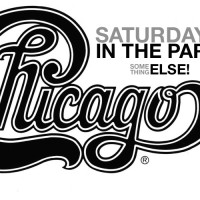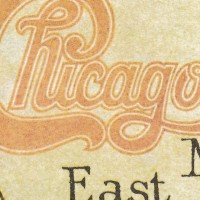When I was a senior in high school in Chicago, there was a radio station from another local school called WARG that used to play the “Elegy” suite which comprised Side 4 of Chicago III. They played “Elegy” immediately after the news of Terry Kath’s death was made known. I remember it like it was yesterday: the DJ said, “Well, if Chicago continues, they will never sound or put out a piece of music like that again!” How prophetic!
My colleague Perplexio noted that the third album is “Chicago taking itself seriously.” I never thought of it that way, but it really is true. The one moment of goofiness is Kath’s “An Hour In The Shower” but, for the most part, the band that could and did do anything possible musically was indeed in a serious mood. The poster of a cemetery, complete with crosses and band members dressed in uniforms from all the major U.S. wars? That’s serious, folks!
The “Elegy” suite kicks off with “When All the Laughter Dies in Sorrow,” a poem by Kindrew Lacelles, which is read by Robert Lamm in a very solemn tone. The rather chilling narrative is about visitors from another planet finding a devastated Earth mostly destroyed in a nuclear war. The poem serves as an introduction to trombonist James Pankow’s “Canon,” another of his classically influenced pieces. I personally feel Pankow’s writing was at a creative peak on the first few albums. “Canon” is just the horn section, multi-tracked and playing beautiful lines that J.S. Bach would be proud to claim. Let’s not forget Jimmy’s amazing trombone tone, which was at its peak during the Kath years.
“Once Upon a Time” is a simply gorgeous melody played by Walt Parazaider on flute. Robert Lamm provides some beautiful counterpoint on piano. Despite the “Peter Cetera isn’t a musician” claim in the trash-talking Now More Than Ever band-produced documentary, he really holds it all together with his exceptional bass guitar work. Obviously, this piece is meant to represent the natural beauty that was once found on Earth. James Pankow’s trombone beautifully takes over the melody from Walt, leading to more classical horn work leading to a “composition” from producer James Guercio called “Progress?”
The above-mentioned piece contains dozens of horn section overdubs that are, again, very Baroque in nature. (Pankow has always been a Bach fanatic.) Guercio’s contribution is rounding up several jarring sounds of traffic, jackhammers and finally a flushing toilet – all “courtesy of the Industrial Revolution” – which eventually overwhelm the horns. See what he did there? It’s all going down the toilet. Subtle as a jackhammer! This selection would be a lot more enjoyable without the sound effects. I’d have preferred the horn chorale to go on and build, but what do I know?
After the flush (!), we are thrown into a bebop/funk rhythm that only Terry Kath (guitar), Peter Cetera (the so-called non-musician is on bass), Danny Seraphine (the inconsistent drummer per the documentary – yeah, right) and Robert Lamm’s churning B-3 organ could create. The horns play a joyous, funky and fun melody just made for jamming. This is the final party before the looming apocalypse. Everyone except Cetera and Seraphine gets to solo, and they all do very well. No soloing chops in the original band? I beg to differ!
The last selection is “Man Vs: Man, The End” and it’s about as cheery as the title. Danny Seraphine’s martial drumbeat backs some rather ominous horn lines that eventually wrap up with several drum breaks and one last ominous chord from the entire band. The effect is like someone slamming a coffin lid on the planet, which is most likely James Pankow’s intended effect.
“Elegy” is not an easy listen for many, but it shows what a staggering range of styles the original Chicago lineup could pull off – and pull off very well.
- Chicago, “Watching All the Colors” (2014): Saturdays in the Park - January 22, 2022
- Chicago, “Love Lives On” from ‘Chicago XXXVI: Now’ (2014): Saturdays in the Park - January 8, 2022
- Chicago, “More Will Be Revealed” from ‘Chicago XXXVI: Now’ (2014): Saturdays in the Park - December 11, 2021




An absolutely spot-on discussion of this Chicago piece. It was unfortunate that Chicago used their self-produced so-called “documentary” as a get-even attack on Saraphine, Cetera, and Guercio. They’ve all shown themselves to be bigger men – refusing to take the bait from these cretins.
Saraphine in particular has come out on top – his fresh, reinterpretations of the original Chicago tune catalog are engaging and refreshing. Around the country are many “Chicago Tribute” bands that in my experience perform these original Chicago tunes better than the current rump band that sells itself as the original.